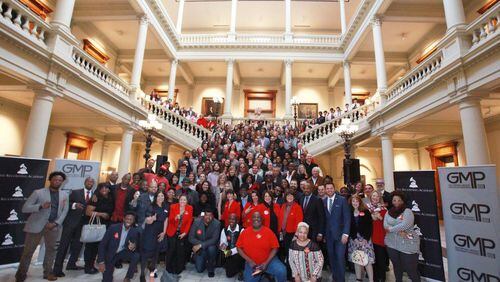BY MELISSA RUGGIERI/AJC Music Scene
The Zac Brown Band lives in Georgia, but in 2012, Brown opted to open his Southern Ground studio in Nashville.
Christian singer Chris Tomlin helped start Buckhead’s Passion City Church with Louie Giglio in 2008, but in 2015, Tomlin and his family moved their lives and careers to Music City. Ditto Christian music stars Francesca Battistelli and Lauren Daigle, both recent Georgia residents — in Canton and Atlanta, respectively — who moved to the city that better fostered their careers.
The exodus of Georgia musicians, primarily to Nashville, is frustrating to the local music community, and it hopes the Georgia Music Investment Act will provide musicians with motivations to stay.
The bill, also known as House Bill 155, was introduced to the Georgia General Assembly earlier this month by state Rep. Amy Carter and is awaiting final approval from the House Ways and Means Committee.
If the bill is signed into law, it will provide Georgia’s music industry with tax cuts and incentives similar to the ones the film industry receives, a movement that has turned the state into the “Hollywood of the South.” The proposed incentives, according to music industry estimates, would bring $9 million in net revenue and spur $2.2 billion of economic activity in the state within five years.
“The music industry is losing its market share in Georgia, and you look at Nashville’s numbers and they keep going up and up,” said Mala Sharma, the legislative affairs chairwoman for Georgia Music Partners, a local advocacy group of musicians, educators and industry professionals seeking to expand Georgia’s music industry footprint. “They have the infrastructure and support and we’re having to play catchup. It’s almost the reverse of what we’re doing with film, taking it from California; Nashville is taking music from us.”
There are three primary components to the Georgia Music Investment Act:
- A 20 percent tax credit for live tour origination (musical or theatrical tours that would rehearse and/or audition in Georgia). To receive credit, a company must spend at least $300,000 annually in the state, whether through hotel, travel, staffing or restaurants, and originate the tour in Georgia. This would not apply to festivals such as Music Midtown or Shaky Knees or single performances in the state.
- A 20 percent tax credit for recording music that will be released for public consumption. To receive the credit, a company must have a minimum aggregate expenditure of $70,000 annually; if, for example, the record label for a developing artist doesn't want to spend $70,000 on one artist, it would still receive the credit if it brought in two projects at $35,000 each.
- A 20 percent tax credit for recording of music that will be synchronized into a film, TV show or video game (projects that already received a tax credit from the film industry would not be eligible). To receive the credit, a company must have a minimum aggregate expenditure of $150,000 annually.
“It all works in tandem,” Sharma said. “We build our ecosystem here — the live production, the scoring for classical musicians around the state and the recording, which helps the studios and the engineers.”
Michele Caplinger, a founding officer and vice president of Georgia Music Partners as well as senior executive director of The Recording Academy’s Atlanta Chapter, also sees a benefit in providing an easier transition for young musicians.
“This (bill) would also means that our college music and music business graduates from any of the 48 postsecondary music programs would no longer have to leave Georgia for a career in music,” Caplinger said. “Georgia is known for its fertile creative soil and a hotbed of homegrown and talented greats. Although (musicians) would like to stay and call Georgia home, we just can’t seem to keep them here working in the state. HB 155 can change our cultural and economic impact for the state.”
Sharma, like Caplinger, served and worked with the Joint House and Senate Music Study Committee to research how other states were attracting musicians, as well as looking at what the film industry has done to become such a success for the state.
“We talked to enough people, whether tour managers or artist managers, to know that if this was passed, they would consider doing projects in Georgia, and also, we can project that in five years we can retain and create more than 10,000 job opportunities throughout the state,” Sharma said. “By not doing something, we’re losing opportunities, we’re losing jobs. By passing this, we’re giving ourselves a chance.”
Follow the AJC Music Scene on Facebook and Twitter.
About the Author







